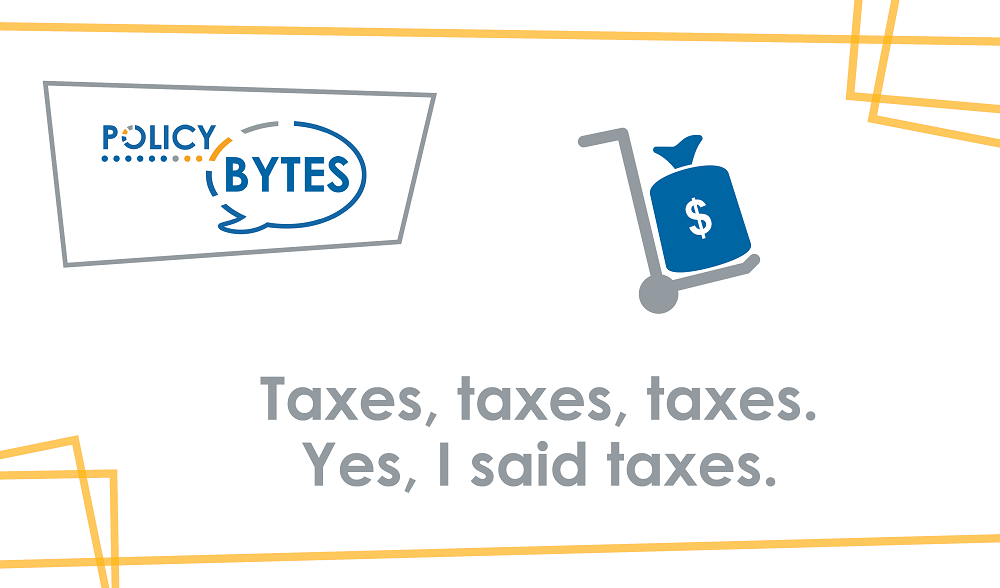Taxes, Taxes, Taxes. Yes, I said taxes
September 4, 2018 - No one cares about taxes. Given the Trumpian headlines and the carbon tax wars this may come as a surprise to you, but it is true. What people do care about is how much things cost. If the total cost is cheap, and taxes make up 90 per cent of that price, no one cares. If something is expensive, or more expensive than it was yesterday, and taxes make up 1 per cent of the total cost, get out the torches and pitchforks!

The carbon tax in B.C., and the government that put it in place, survived, at least in part, because the people of B.C. didn’t see a price impact on their avocado toast or Molson Canadian large enough to make them angry. Yet, in Ontario, anger over rising electricity prices driven by cap and trade and green energy initiatives contributed to the recent defeat of the Liberal government.
This is why Northern Policy Institute is inviting you and other northern leaders to join us in North Bay on September 26 and 27 to talk about “taxing for growth”. What government taxes and how it taxes those things matters. As does how and what government buys with the tax dollars they collect from you. What also matters is who is being taxed and their ability to pay. With apologies to the economists among you, let’s consider a few examples.
If bananas get to be too pricey, I buy apples, or grapes, or oranges. These choices are impacted by lots of things. Things like “elasticity of demand” and “product substitution effects”. What it comes down to though is that I will buy what I need to buy (diapers for my five month old being an example) until the price gets so high I can’t afford not to seek out alternatives (the price will have to get VERY high before we start talking about linen diapers, let me tell you). So, government may have more or less room to tax certain things depending on what you, I, and everyone else is prepared to pay for them.
In addition, who is buying certain things may widen, or narrow, a government’s ability to collect taxes. The price at which I switch from Big Macs to bargain burgers, for example, will be different from the point at which Mr. Trump does. He has way more money (borrowed or otherwise) than I do. So, if something (luxury cars let’s say) are being purchased mostly by the “super-rich”, governments could likely get away with a higher tax.
A carbon tax, however, applied to just about everything and paid by just about everybody would have a much larger effect on my pocket book than on Mr. Trump’s. More to the point, a carbon levy (or any other new tax) would have an even bigger impact on my parents’ ability to pay for their morning coffee or their monthly car payment, given that they are on a fixed income. There are a lot of people my parents’ age in this country, and a very high percentage of them vote.
Regrettably, neither side in the tax debate is particularly open to compromise or to calm, reasoned, debate. If you are pro-tax, any tax cut will led to systemic Armageddon with schools and hospitals closing willy-nilly. If you are anti-tax, every tax cut is pain free with nothing closing and no-one getting fired.
What makes life difficult for the pro-tax folks is that things are, in fact, cheaper if there are no taxes on them. What makes life difficult for the anti-tax crowd is that government, no matter how small and efficient, costs money. So, they are going to have to collect some taxes, at some level, from someone.
In the end, taxes may, or may not, make everything more expensive. They also may, or may not, make the services you need more accessible. Finding that balance is hard work and takes time, experimentation, and compromise. So, come and talk about taxes this September 26 and 27 in North Bay. Let’s see if we can find ways to experiment with taxes in Ontario’s northern regions in order to find the mix that will grow our communities without breaking our collective bank.
Charles Cirtwill is President and CEO of Northern Policy Institute. This column first appeared in Northern Ontario Business.
The content of Northern Policy Institute’s blog is for general information and use. The views expressed in this blog are those of the author and do not necessarily reflect the opinions of Northern Policy Institute, its Board of Directors or its supporters. The authors take full responsibility for the accuracy and completeness of their respective blog posts. Northern Policy Institute will not be liable for any errors or omissions in this information, nor will Northern Policy Institute be liable for any detriment caused from the display or use of this information. Any links to other websites do not imply endorsement, nor is Northern Policy Institute responsible for the content of the linked websites.
Northern Policy Institute welcomes your feedback and comments. Please keep comments to under 500 words. Any submission that uses profane, derogatory, hateful, or threatening language will not be posted. Please keep your comments on topic and relevant to the subject matter presented in the blog. If you are presenting a rebuttal or counter-argument, please provide your evidence and sources. Northern Policy Institute reserves the right to deny any comments or feedback submitted to www.northernpolicy.ca that do not adhere to these guidelines.
